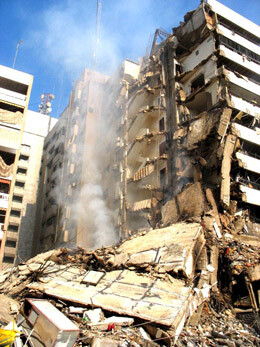IRIN 17 August 2006

Ten-storey building in Haret Hreik, 15 August 2006. (Marie Claire Feghali/IRIN)
“With all the dust and smoke in the air, it is unbearable walking around the southern suburbs of Beirut,” said Marie Claire Feghali, a journalist with An-Nahar newspaper. “Even while wearing face masks, my colleague and I struggled to breathe. In fact, she has not stopped coughing since our return to the office several hours ago.”
The Israeli military campaign in Lebanon followed the capture on 12 July of two Israeli soldiers by the armed wing of the Lebanese political party Hezbollah. After 34 days of conflict, a United Nations-brokered cessation of hostilities came into effect on Monday morning.
During the conflict, Israel’s air force carried out approximately 7,000 aerial attacks throughout Lebanon while its navy conducted more than 2,500 bombardments of the Lebanese coast, according to the Israeli military.
This included the bombing of some 10,500 houses and 900 other private buildings in addition to roads, bridges, factories and other infrastructure with the stated intention of “dismantling terror infrastructure”.
This destruction has released large amounts of chemical and dust particles into the atmosphere. These chemicals cause long-term health issues such as respiratory problems and cancer.
“The combination of toxic fumes that has been spreading for the past five weeks, which people have inhaled and is already in their bodies, is a great source of contamination,” said Greenpeace campaigner Zeina al-Hajj.
Israel’s attacks of fuel tanks at the Jiyeh power station on 13 July and 15 July caused a 10,000-tonne oil spill into the Mediterranean Sea, which could not be cleaned up because of the ongoing fighting.
These bombings on the fuel tanks also resulted in a fire that burned for three weeks, releasing a cloud of smoke which hung over Beirut and central Lebanon and which could be seen from 60km away.
“The fuel tanks released a cloud of polyaromatic hydrocarbons, dioxins and particulate matter, and all of these could cause cancer, respiratory problems and hormonal problems,” said Wael Hmaidan, a coordinator with the Beirut-based Greenline organisation.
The bombing of factories that made products such as glass, foodstuffs and plastics has also released these chemicals and chlorine into the atmosphere in central areas of Lebanon, potentially affecting as many as 2 million people.
“The oil spill is the most visible environmental damage of this disaster but of course there are many more, al-Hajj said. “The bombs themselves are a problem. With all the chemicals that are in them and the amount that have been dropped, there you have an environmental disaster in itself.”
The bombing of electricity transformers such as the one that was hit by Israeli air strikes in the town of Sidon on 12 August resulted in the release of polychlorinated biphenyls (PCBs) into the atmosphere. Lebanon still uses transformers that contain parts that were made with PCBs, despite an international ban on the substance.
“These are chemicals that are bio-accumulative and persistent so when you inhale them they stay in your body, and they cause cancer,” said al-Hajj.
Environmental experts say the ongoing conflict has prevented them from carrying out a proper assessment of the situation.
“Lebanon does not have the resources to deal with this,” said Omer Naiem, a communications officer with Greenpeace. “A lot of countries are willing to come and help but nobody was able to come in while bombs were being dropped. Nobody really knows the full scale of the damage on Lebanon.”
This item comes to you via IRIN, a UN humanitarian news and information service, but may not necessarily reflect the views of the United Nations or its agencies. All IRIN material may be reposted or reprinted free-of-charge; refer to the copyright page for conditions of use. IRIN is a project of the UN Office for the Coordination of Humanitarian Affairs.
Related Links